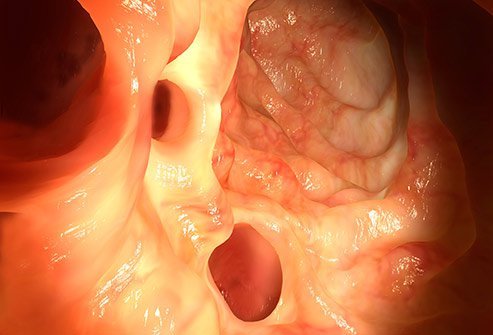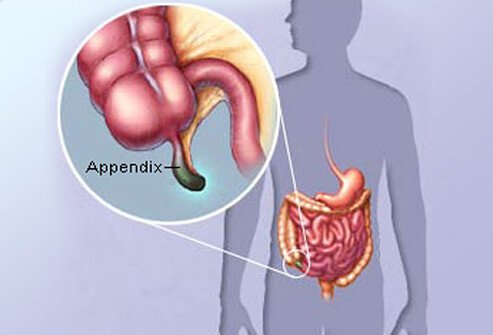
Diverticular disease and diverticulitis both affect the large intestine (bowel).
The severity of diverticulitis symptoms is determined by the amount of inflammation present. Pain in the left lower abdomen is the most common symptom. Nausea and vomiting, constipation, diarrhea, and bladder symptoms such as pain or burning when peeing or the desire to urinate frequently are other possible symptoms.
Diverticulitis can lead to a colovesical fistula, in which the inflammation may cause a false passage to develop between the bladder wall and intestine. Common symptoms of such a fistula include pneumaturia (air while passing urine), fecaluria (passing fecal matter with urine), urinary tract infections (UTIs), abdominal discomfort, and dysuria (pain while urinating).
Adhesions due to diverticulitis could cause the gut to kink and become clogged, resulting in vomiting and agony when food is forced through the constricted intestine. Additionally, an inflammation of the bladder might occur, resulting in an urge to urinate more frequently.
Early or mild diverticulitis might appear with minor abdominal soreness, similar to gastroenteritis or a UTI.
What is diverticulitis?
Diverticular disease and diverticulitis both affect the large intestine (bowel). Diverticula are little bulges or pockets that can form in the intestine’s lining as you age. The majority of people with diverticula do not experience any symptoms and are only diagnosed after undergoing a scan for another reason.
- Diverticulosis is a condition in which there are no symptoms.
- Diverticular disease occurs when diverticula create symptoms such as pain in the lower abdomen.
- Diverticulitis occurs when the diverticula become inflamed or infected, resulting in more severe symptoms.
- If you don’t eat enough fiber, you’re more prone to get diverticular disease and diverticulitis.
Diverticulitis is a condition in which the fecal matter and bacteria accumulate in the diverticular pouches resulting in inflammation.
What are the symptoms of a diverticulitis flare-up?
In many cases, diverticulosis does not cause any symptoms. The condition may go undiagnosed until a routine colonoscopy is performed. When diverticulosis causes symptoms, it is called a diverticulitis attack or flare-up. People may have multiple, recurring episodes of flare-ups. Symptoms usually occur suddenly and may persist for days.
The most common signs and symptoms of a diverticulitis flare-up include:

SLIDESHOW
Appendicitis: Symptoms, Signs, Causes, Appendectomy in Detail See Slideshow
What causes diverticulitis?
Some possible causes of and risk factors for diverticulitis are as follows:
- Genetics: Genetics may play an important role. Having family members who have diverticulitis increases the risk of this condition.
- Age: The risk of diverticulitis increases with age, usually over the age of 40.
- Smoking: Nicotine and other chemicals in cigarettes and tobacco products can weaken the lining of the colon causing diverticulosis and, in turn, diverticulitis.
- Dehydration: Dehydration affects digestion, leading to the accumulation of waste products and harmful bacteria in the colon.
- Medications: Some medications, such as long-term painkillers or steroids, can cause weakening or irritation of the colon.
- Sedentary lifestyle: Regular exercise may reduce the risk of diverticulitis.
- Obesity: Being overweight exerts increased pressure on the colon, increasing the risk of diverticulosis and diverticulitis.
- Constipation: Chronic straining while passing stools increases the pressure on the wall of the colon.
Drugs that increase the risk of diverticulitis
Several medicines, including steroids, opioids, and nonsteroidal anti-inflammatory drugs such as ibuprofen (Advil, Motrin IB, and others), have been linked to an increased risk of diverticulitis.
Latest Digestion News
Daily Health News
Trending on MedicineNet
What diet should you follow if you have diverticulitis?
Your doctor may prescribe a diverticulitis diet as part of a short-term treatment plan for acute diverticulitis.
Mild cases of diverticulitis are normally treated with antibiotics and a low-fiber diet, or treatment may include a period of rest, during which you eat nothing through the mouth, then clear liquids, and finally a low-fiber diet until your condition improves. Severe cases almost always necessitate hospitalization.
Diverticulitis nutrition therapy is a temporary solution to allow your digestive system to relax. Consume a tiny amount of food until bleeding and diarrhea stop.
For a few days, your diet consists of clear liquids. On a clear liquid diet, you can eat the following foods:
- Broth
- Apple juice, which is a pulpless fruit juice
- Chips of ice
- Fruity ice pops with no fruit chunks or pulp
- Gelatin
- Water
- Coffee or tea without cream
As you begin to feel better, your doctor will advise you to increase your intake of low-fiber meals gradually. Low-fiber foods include:
- Fruits that haven’t been canned or cooked and haven’t had their skins or seeds removed
- Green beans, carrots, and potatoes, either canned or cooked (without the skin)
- Poultry, eggs, and fish
- White bread that has been refined
- Juice from fruits and vegetables that hasn’t been pulped
- Cereals with a low fiber content
- Cheese, yogurt, and milk
- Results for white rice, pasta, and noodles
Within two or three days of commencing the diet and medicines, you should feel much better. Call your doctor if you haven’t started feeling better by then.
Medically Reviewed on 5/19/2022
References
Drugs.com
https://www.drugs.com/cg/diverticulosis.html
https://www.uptodate.com/contents/diverticular-disease-beyond-the-basics/print#:~:text=The%20symptoms%20of%20diverticulitis%20depend,the%20frequent%20need%20to%20urinate.